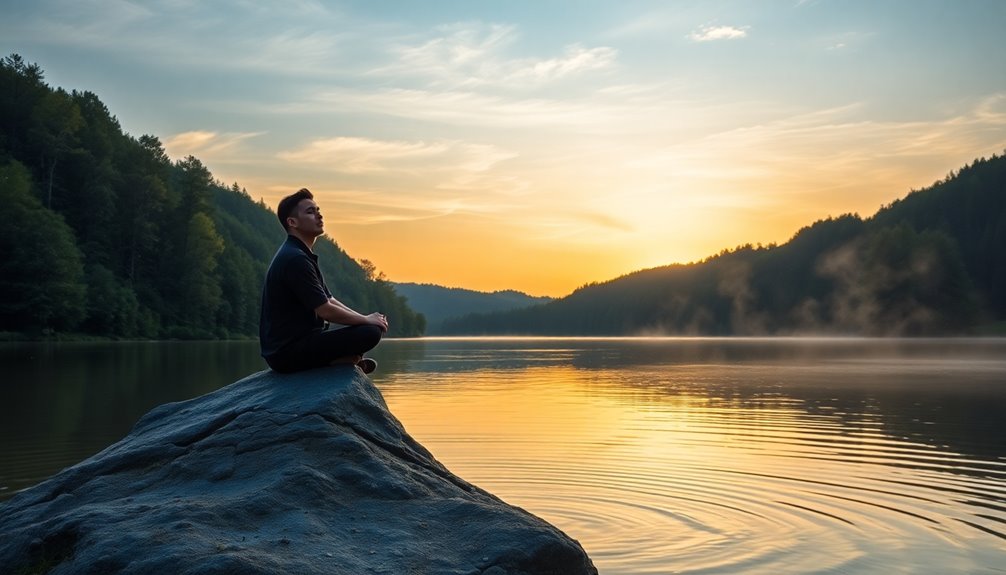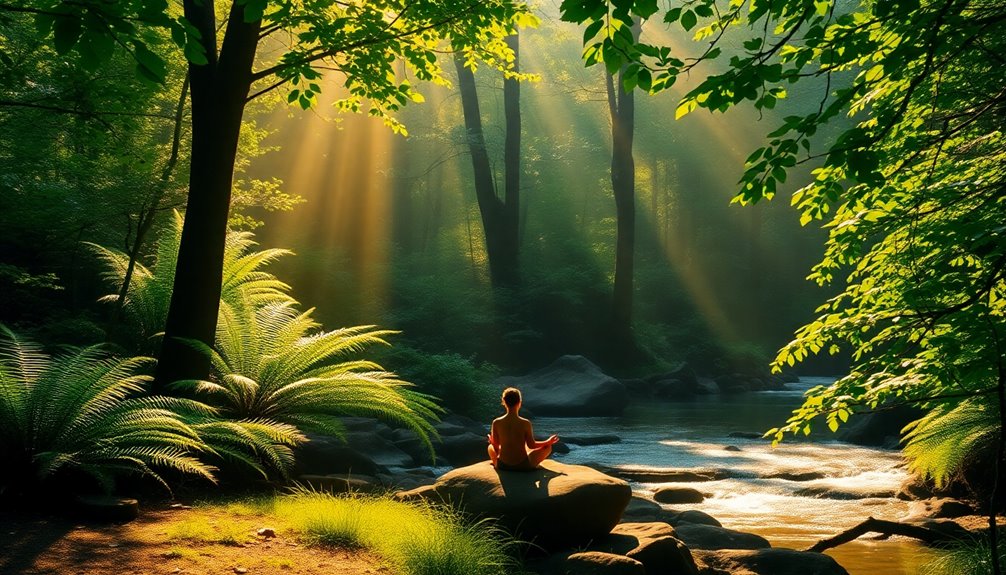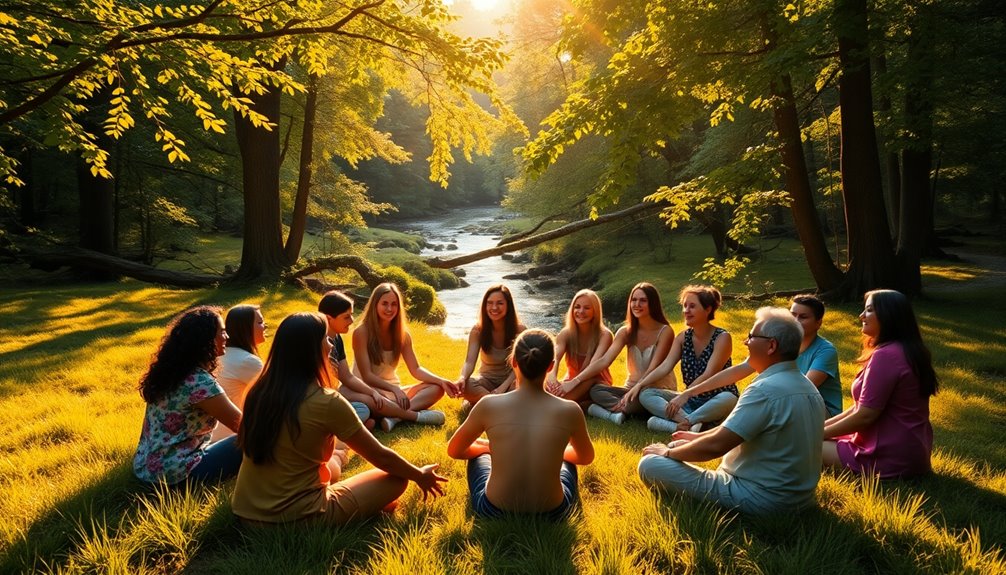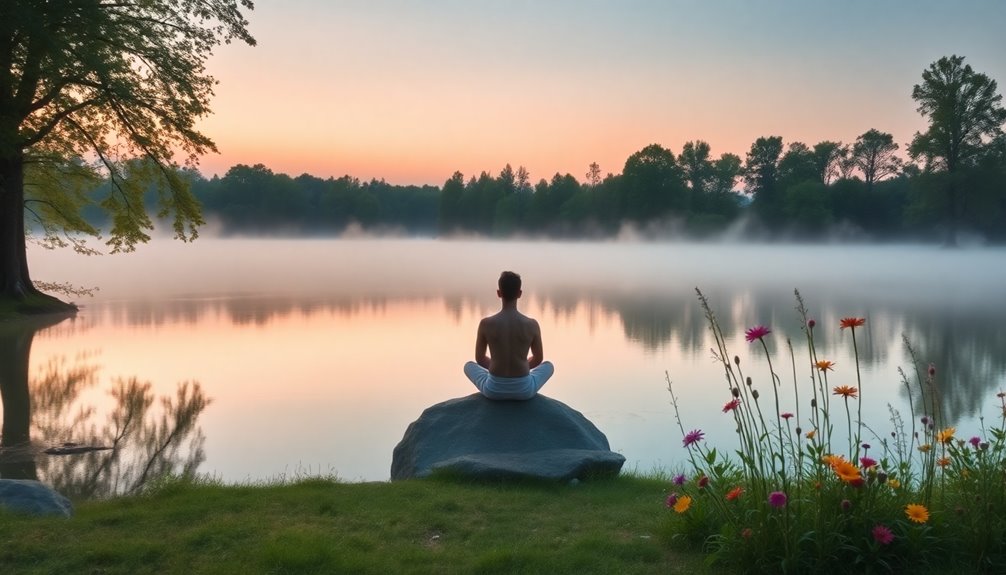Spiritual retreats are important because they provide you with time for deep self-reflection, mental healing, and community connection. In a structured, distraction-free environment, you can explore your emotions and confront past traumas, all while supported by a like-minded community. Practicing mindfulness through meditation and yoga sharpens your focus and enhances your overall well-being. You not only find clarity but also build connections that last beyond the retreat. These transformative experiences nurture both your mind and soul, offering lasting benefits. There's much more to uncover about how retreats can impact your life positively.
Key Takeaways
- Spiritual retreats provide a structured environment for deep self-reflection and exploration of personal beliefs and values.
- They facilitate mental and emotional healing by offering safe spaces to confront past traumas and foster emotional release.
- Mindfulness practices taught during retreats enhance present-moment awareness, promoting overall mental clarity and emotional balance.
- Participants learn meditation and yoga techniques that contribute to long-term mental and physical well-being through stress reduction.
- The sense of community developed in retreats fosters belonging, support, and lifelong connections that enhance emotional health.
Time for Self-Reflection

When you step into a spiritual retreat, you enter a structured environment that fosters deep self-reflection.
You'll find a quiet, distraction-free space that allows you to disconnect from daily noise, giving your mind the freedom to explore your thoughts.
With guided activities like meditation and journaling, you're encouraged to investigate deeper into your inner self.
The supportive community around you makes it easier to share and explore emotions, helping you feel comfortable in your journey.
Mindful walking and other practices heighten your awareness, enabling you to observe your thoughts without judgment.
Each moment spent in this personalized experience enhances your clarity and strengthens your sense of self, paving the way for meaningful insights and growth. Additionally, this environment significantly contributes to mental and emotional healing, allowing participants to address past traumas in a safe space.
Mental and Emotional Healing

Spiritual retreats offer a unique opportunity for mental and emotional healing, as they create a safe space for you to confront past traumas and release emotional baggage.
In this nurturing environment, you can engage in therapeutic activities like meditation, yoga, and group discussions that foster emotional release. The sense of community provides support and encourages you to share experiences without judgment. Additionally, many retreats emphasize self-discovery and introspection, allowing you to delve deeper into your emotional landscape and gain clarity on your feelings.
You'll also learn healthier coping strategies to navigate life's challenges, promoting emotional resilience. Nature's calming presence at many retreats helps reduce stress and anxiety, enhancing your overall well-being.
Developing Mindfulness

While you commence on a spiritual retreat, developing mindfulness becomes a transformative journey that heightens your awareness of the present moment.
You'll engage in mindfulness practices like meditation and guided sessions that sharpen your focus. Additionally, the power of imagination can enhance your mindfulness experience, allowing you to visualize and manifest your intentions.
Walking in nature allows you to connect with your surroundings, enriching your experience. Additionally, the retreat offers opportunities for community support, which enhances the overall experience of mindfulness.
The structured environment fosters consistent encounters with your thoughts and feelings, promoting awareness routines. With techniques like mindful eating and dharma talks, you'll explore deeper into your present state.
Embracing silence helps you stay attuned to your inner self, easing distractions. This focus on the present enhances clarity, boosts emotional balance, and fosters a profound appreciation for simple moments, ultimately guiding you toward inner peace and spiritual growth.
Learning Meditation and Yoga

As you cultivate mindfulness, the next step in your journey often involves learning meditation and yoga.
Spiritual retreats provide a structured environment where you can engage deeply in these ancient practices, guided by experienced teachers. You’ll explore various techniques, discovering what resonates with you. Holistic approaches during retreats aid in long-term health improvements, encouraging you to adopt healthier lifestyle choices. In addition to exploring various techniques, many retreats also incorporate elements of cultural and spiritual significance, such as orthodox blessing traditions explained, allowing you to connect with the rich heritage of these practices. Engaging in group activities fosters a sense of community, providing support and encouragement as you embark on your personal journey of growth and healing. Ultimately, these immersive experiences can lead to profound transformations, equipping you with tools to maintain balance and well-being long after the retreat ends.
Guided sessions help you master your practice while fostering stress reduction and emotional healing. The immersive experience allows you to focus without distractions, developing a consistent routine that can transform your daily life.
You'll notice improved mental and physical well-being, enhanced mindfulness, and better sleep.
Ultimately, learning meditation and yoga at a retreat can lead to significant personal growth and long-lasting benefits, enriching both your mind and body.
Connection With Community

Engaging in a spiritual retreat not only allows you to deepen your personal practice but also helps you connect with a community of like-minded individuals.
Through shared experiences and group activities, you foster a sense of belonging and unity. The safe, non-judgmental space encourages open communication, letting you share your challenges and inspire one another. Community enhances the overall retreat experience as you engage in meditation, dharma talks, and collective chores that bring everyone closer. Many participants find that these interactions lead to improved mental wellbeing index scores, highlighting the positive impact of community on emotional health.
You'll find comfort in knowing you're not alone, as emotional support enhances your well-being and promotes healing. Practicing in community softens boundaries, teaching you valuable lessons in kindness and compassion.
Ultimately, these retreats forge lifelong connections that provide ongoing support, encouraging you to stay engaged with this nurturing network long after the retreat ends.
Frequently Asked Questions
How Long Do Typical Spiritual Retreats Last?
Typical spiritual retreats last anywhere from 2 to 10 days, with 3 to 7 days being the most common.
You'll find that many first-timers spend the initial days adjusting and recovering. By the third day, meaningful activities usually begin.
If you can, consider longer retreats to dive deeper into your spiritual journey.
Ultimately, the ideal duration should align with your personal needs and schedule, ensuring you get the most from the experience.
What Should I Bring to a Spiritual Retreat?
When you're packing for a spiritual retreat, focus on comfort and essentials.
Bring seasonal clothing, comfortable loungewear, and sturdy shoes for outdoor activities.
Don't forget toiletries, personal hygiene items, and any necessary medications.
Pack a refillable water bottle, sunscreen, and a journal for reflection.
Also, consider entertainment like a book or sketch pad.
Finally, include a first aid kit and a trash bag for clean-up.
These items will help you feel prepared and relaxed.
Are Spiritual Retreats Suitable for Beginners?
You might think that spiritual retreats are only for seasoned gurus, but they're actually perfect for beginners!
You'll find structured environments with guided meditations and workshops that make learning easy. Plus, you'll connect with a supportive community that encourages you.
Retreats offer flexibility, allowing you to participate at your own pace, and provide a peaceful setting for self-reflection.
Can I Attend a Retreat Alone?
Yes, you can absolutely attend a retreat alone! Many people find solo retreats to be a transformative experience.
You'll have the space to reflect, grow, and connect deeply with yourself. Even if you're alone, you'll still meet like-minded individuals, fostering a sense of community.
Plus, the structured environment and guidance from facilitators will support your journey. Embrace the opportunity for self-discovery and personal growth in a safe, nurturing atmosphere.
What Is the Cost of Spiritual Retreats?
Imagine planting a garden; the costs for a spiritual retreat can be similar.
You're looking at initial setup costs ranging from $150,000 to $800,000, depending on property and construction.
To create a nurturing space, allocate another $50,000 for meditation and yoga areas.
Plus, factor in accommodations and amenities, which can add several thousand dollars.
Ultimately, your experience might cost between $500 to $2,000 per participant, based on location and offerings.
Conclusion
In a world that rushes you forward, a spiritual retreat invites you to pause and reflect. While daily life often overwhelms your mind, these retreats offer a sanctuary for healing and clarity. You learn to cultivate mindfulness amidst chaos, finding peace in stillness. As you connect with others on similar journeys, you realize that solitude and community coexist, enriching your soul in unexpected ways. Embracing this balance can transform your life, nurturing both your inner self and your relationships.









